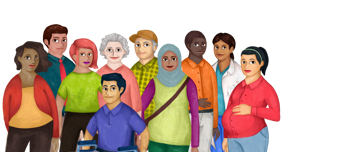
Information may help advance precision mental health care
The National Institutes of Health’s All of Us Research Program has released a vast and novel set of data to help advance and improve how mental and cognitive health disorders are defined, diagnosed, and treated. The All of Us dataset is now even better positioned to accelerate research in mental health and chronic conditions as the data are included in the program’s Researcher Workbench alongside genomic, clinical, and lifestyle information.
“We are helping to fill an unmet need in efforts to advance and redefine what we know about mental health conditions,” said Holly A. Garriock, Ph.D., chief cohort development officer of the All of Us Research Program at NIH. “Researchers can explore the role of genetics, environment, and lived experiences in supporting resilience, understanding risk, and improving treatment options for these conditions.”
Exploring the Mind Cognitive Data
Supported by the National Institute of Mental Health and others, Exploring the Mind is an All of Us partnered research study that collected data from four cognitive tasks to quantitatively measure different aspects of brain function and health, including participants’ attention span, decision-making, response time and accuracy, and ability to recognize emotions. The tasks were created by the nonprofit TestMyBrain platform, led by The Many Brains Project. Participants accessed the exercises through the program’s online participant portal.
This initial release of cognitive data from 36,000 participants is the first of its kind available to All of Us researchers. The data, which shed light on how the brain processes information, will give researchers a more complete picture of the patterns of behavior associated with mental health disorders and certain diseases.
Mental Health and Well-Being Survey Data
The new mental health data was collected through two surveys covering a range of behavioral and emotional health topics, including depression, anxiety, personality, self-harm, and others. Responses from 110,000 participants will allow researchers to learn more about how mental health and well-being can affect overall health, especially since this information may be missing from participants’ electronic health record data, also available on the Researcher Workbench.
In developing the surveys, the program sought to align with the world’s other large cohorts, such as the UK Biobank. This harmonization will allow replication analyses as well as meta-analyses to enhance the rigor and power of research. Additionally, the surveys include repeat measures from the program’s COVID-19 Participant Experience (COPE) surveys that collected data from 2020-2021, to assess participants’ experiences over time.
The new cognitive and mental health data are available on the secure, cloud-based All of Us Researcher Workbench. The platform includes data from more than 633,000 participants, including data from biosamples, electronic health records, 10 surveys, wearable devices, and physical measurements. More than 15,000 researchers from all 50 states and beyond are using the data to advance research and discoveries.
